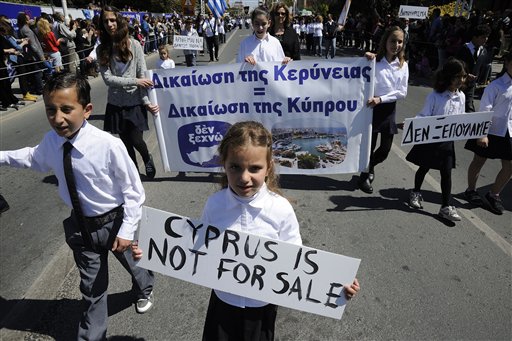NICOSIA, Cyprus — Cyprus ordered banks to remain closed for two more days over fears of a run by customers trying to get their money out, after striking a pre-dawn bailout deal Monday that averted the country’s imminent bankruptcy.
The sudden midnight postponement of the much-anticipated Tuesday bank opening by all but the country’s two largest lenders was sure to hammer businesses already reeling from more than a week of no access to their deposits.
ATMs have been dispensing cash but often run out, and an increasing number of stores and other businesses have stopped accepting credit or debit cards. The two largest lenders, the struggling Laiki and Bank of Cyprus, have imposed a daily withdrawal limit of $130.
Cyprus clinched an 11th-hour deal with the 17-nation eurozone and the International Monetary Fund early Monday for a $13 billion bailout. Without it, the country’s banks would have collapsed, dragging down the economy and potentially pushing it out of the eurozone.
Under the deal, the country agreed to slash its oversized banking sector and inflict hefty losses on large depositors in troubled banks.
The country’s banks have been closed since March 16 to avert a run on deposits as the country’s politicians struggled to come up with a way to raise enough money to qualify for the bailout. An initial plan that would have raised 5.8 billion euros by seizing up to 10 percent of people’s bank accounts enraged depositors and was soundly rejected by lawmakers early last week.
But with the immediate crisis averted, worry spread across Europe that the deal could boomerang, spooking investors and hurting the eurozone’s efforts to keep its debt crisis from spreading.
“The Cypriot bailout has a powerful legacy which may alter the security with which depositors elsewhere in the eurozone view the safety of banks,” said Jane Foley, an analyst at Rabobank International.
The initial plan to seize a percentage of all deposits sent jitters across the eurozone.
European officials, anxious to prevent any further spread of the financial crisis that has already left Greece, Ireland and Portugal dependent on bailout funds, had been at pains to point out that Cyprus was a unique case.
The country of about 800,000 people has a banking sector eight times larger than its gross domestic product, with nearly a third of the roughly 68 billion euros in the country’s banks believed to be held by Russians. Germany in particular long insisted that Cypriot banks, which attracted foreign investors with high interest rates, needed to contribute to the bailout.
Jeroen Dijsselbloem, the Dutch finance minister who chairs the Eurogroup gathering of the eurozone’s finance ministers, said Monday that inflicting losses on the banks’ shareholders, bondholders and large depositors should become the eurozone’s default approach for dealing with ailing lenders.
“If I finance a bank and I know if the bank will get in trouble I will be hit and I will lose money, I will put a price on that,” Dijsselbloem said in a joint interview with the Financial Times and Reuters. “I think it is a sound economic principle. And having cheap money because the risk will be covered by the government, and I will always get my money back, is not leading to the right decisions in the financial sector.”
However, forcing losses on large deposits could encourage investors to pull money out of weaker southern European economies for more stable nations in the north, like Germany.
That concern was evident in markets.
The euro currency, used by more than 330 million Europeans, initially rose against the dollar to about $1.30 on news of the bailout agreement, but tanked below $1.29 – its lowest level since November – following Dijsselbloem’s remarks. European stock market indexes also lost their earlier gains, with bank shares hardest-hit, particularly in financially weak countries like Italy and Spain.
After a whirlwind of nervous market reactions, Dijsselbloem issued a terse clarifying statement, saying Cyprus was “a specific case with exceptional challenges which required the bail-in measures.”
Under the new Cyprus bailout plan, the bulk of the funds will be raised by forcing losses on accounts of more than 100,000 euros in the country’s second- largest lender, Laiki, and its top lender, Bank of Cyprus, with the remainder coming from tax increases and privatizations.
Speaking about the marathon 10-hour negotiations in Brussels that resulted in the deal, Cyprus President Nicos Anastasiades said “the hours were difficult, at some moments dramatic. Cyprus found itself a breath away from economic collapse.”
Send questions/comments to the editors.



Success. Please wait for the page to reload. If the page does not reload within 5 seconds, please refresh the page.
Enter your email and password to access comments.
Hi, to comment on stories you must . This profile is in addition to your subscription and website login.
Already have a commenting profile? .
Invalid username/password.
Please check your email to confirm and complete your registration.
Only subscribers are eligible to post comments. Please subscribe or login first for digital access. Here’s why.
Use the form below to reset your password. When you've submitted your account email, we will send an email with a reset code.